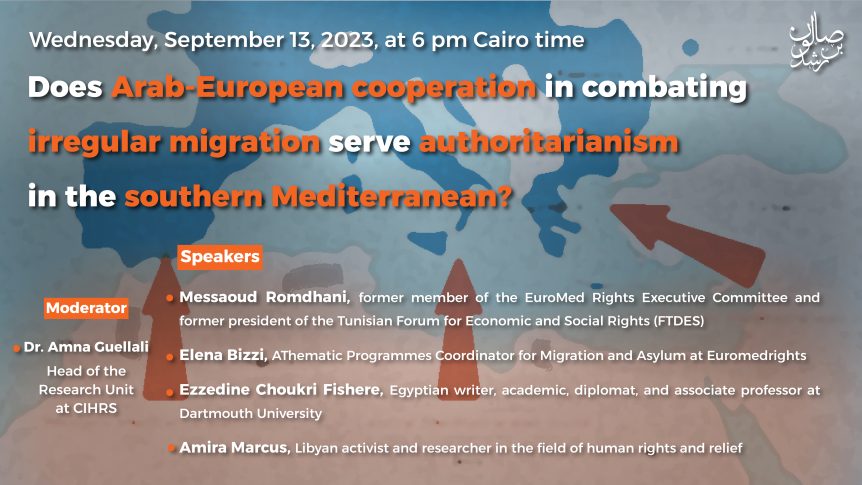The Cairo Institute for Human Rights Studies (CIHRS) hosted a seminar on the evening of Wednesday, 13 September, as part of its Salon Ibn Rushd, under the title “Does Arab-European cooperation in combating irregular migration serve authoritarianism in the southern Mediterranean?” The panel discussion featured Messaoud al-Romdhani, former Executive Committee member of EuroMed Rights; Elena Bizzi, Thematic Programmes Coordinator for Migration and Asylum at EuroMed Rights; Ezzedine Fishere, Egyptian writer and academic, and Amira Marcus, Libyan human rights activist. The meeting was moderated by Karim Salem, a researcher at CIHRS.
Elena Bizzi began the discussion by underscoring the catastrophic humanitarian consequences of the increasingly restrictive deportation and migration policies
of the European Union and its member states towards persons from the Middle East and North Africa region. She explained how the European Union, since 2015, has sought to prevent the arrival of migrants and asylum seekers on European soil through a variety of means, including through unconditional funding to migrant-sending countries
The impact of these restrictive migration policies on empowering and legitimizing authoritarian governments in the region was the focus of Messaoud al-Romdhani’s contribution to the seminar. Cooperation between Europe and the region’s authoritarian regimes has become a form of “blackmail,” he explained, where the price paid is European silence on human rights violations in the region. In return, these authoritarian regimes act as guardians of Europe’s borders, gaining the legitimacy for necessary for their continued rule. Moreover, the deterioration of national economies in the southern Mediterranean pushes rulers to use aid funding to support their weak economies and purchase more security equipment to tighten their control internally.
Europe’s restrictions on immigration have significantly increased recently , emphasized Amira Marcus. As the crises facing the Middle East and North Africa region worsen, so too does the restriction of opportunities for migration, even through legal channels. The increasing numbers of migrants irregularly coming to Europe these days, she explained, “is a natural result of these systems and policies that have denied people the chance to seek a better life for themselves and their families through legal means.”
Ezzedine Fishere, however, considered the crisis faced by migrants as not the responsibility of European countries. The real reasons for the crisis, he asserted, lie in the absence of decent living opportunities for migrants in their own countries, causing them to pin all their hopes on migrating, whether through legal or illegal problems. The problem, he explained, lies not only in the authoritarianism of the region’s ruling regimes but also in their economic and political weakness:
“We are economically and politically weak countries. This clear weakness in the internal political, social, and economic structures always places us in the position of countries seeking assistance [requesting] and most willing to make concessions. Unless this failure is addressed, migration will continue, and it will continue to be used for political purposes.”
Watch the full recording of the seminar here:
Share this Post

